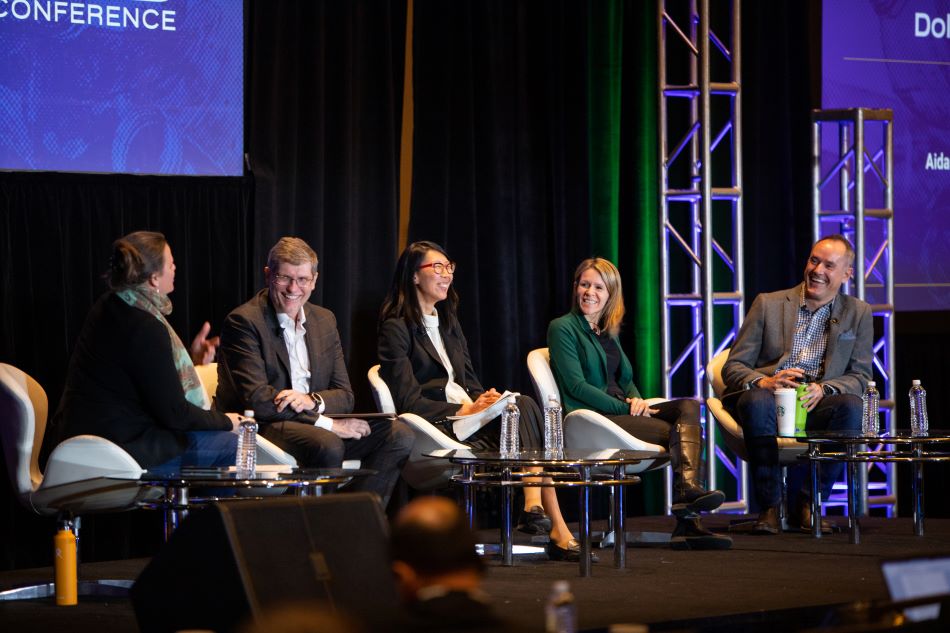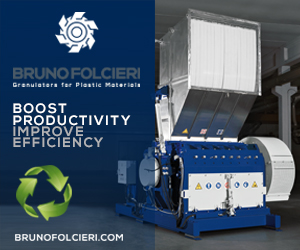
Panelists (L-R) Kate Davenport with Eureka Recycling, Neil Cameron with Emerald Technology Ventures, Jen Louie with Closed Loop Partners, Aidan Madigan-Curtis with Eclipse Ventures and Ian Arthurs with Circular.co discussed recent investor interest in the recycling sector at the 2023 Plastics Recycling Conference. | Big Wave Productions/Plastics Recycling Update
Recycling entrepreneurs and venture capitalists should ask questions, find the right match and focus on market realities to forge a successful relationship, according to experts from both sides of the coin.
The insights came from the “Connecting With Investment Dollars to Fuel Growth” session at the 2023 Plastics Recycling Conference, held March 6-8 in National Harbor, Md.
Panelists were Ian Arthurs, CEO of Circular.co, a digital supply chain for recycled plastics that launched last year with funding from Eclipse Ventures; Aidan Madigan-Curtis, a partner at Eclipse Ventures; Jen Louie, managing director of Closed Loop Partners; and Neil Cameron, a partner at Emerald Technology Ventures.
The panel was moderated by Kate Davenport, co-president of Eureka Recycling.
“The thesis basically is if you’re a little company and you want to be a big company, you need big friends,” said Cameron of Emerald Technology Ventures, a multinational venture firm with about 50 global corporate strategic investors providing about a billion dollars for the company to work with. “All of our limited partners are your big friends, and so we do our very best to make that happen.”
Industry attracts investors
Cameron had a simple answer to why investors are so interested in the recycling sector as of late: “Big problems, big solutions, big rewards.”
Another part of why investors are showing more interest in the recycling space is that it’s a growing market, added Madigan-Curtis of Palo Alto, Calif.-based Eclipse Ventures, which has $4 billion under management.
“This is a massive market – $650 billion or so of plastics are transacted in any given year,” she said. “That’s both an exciting number for a venture capitalist – you want to sell into big markets – but it’s also a terrifying number when you think what that means for the world. It is projected to grow almost a trillion dollars by 2030, for better or for worse.”
Madigan-Curtis said Eclipse Ventures is seeking companies and ideas that focus on reimagining what plastic can be and moving away from virgin plastics.
“We’re going to stay close and watch which players have a differentiated technology in attacking it and are proving out key technical milestones that show they can really go grab some of those really big dollars at play,” she said.
“If you’ve got a great business and great product, who do you want to partner with to fuel your growth? It’s not just the capital.” –Ian Arthurs, Circular.co
Another factor is the visibility of the plastics recycling problem, Madigan-Curtis said, as we collectively live through more climate disasters and the general public pushes for more change.
However, Davenport, Madigan-Curtis and Louie all noted that while the influx of investment dollars is exciting, the majority is heading toward innovation and new technologies, when there’s an acute need for more investment in infrastructure.
“I think it’s exciting to see how much capital is flowing into this space,” Louie said. “But … I don’t know that there’s enough dollars going into the infrastructure part of it. I think it’s important that we continue to innovate and the dollars are important, but I would love to see more of the risk tolerant, flexible capital that’s needed if we really want to make this transition from a linear to a circular economy.”
Louie added that increasing regulation also plays a part: “There’s a lot of activity right now from a regulatory perspective. We live in what feels like an increasingly fast-paced world.”
How to get a share
To improve their odds of attracting investors’ dollars, companies should target specific venture firms that would be a good match, Arthurs said.
“If you’ve got a great business and great product, who do you want to partner with to fuel your growth?” he said. “It’s not just the capital.”
Madigan-Curtis said when Eclipse Ventures looks to invest, it looks for entrepreneurs “living the problems that they’re trying to solve, who have the technical backgrounds that you’re looking for, who have the grit and the vision to actually make a difference.”
“The last thing you want is people looking from the outside in, imagining they know the solution to something without actually, what I would describe as, extreme validation,” she said, adding that extreme validation is ensuring “that you’re actually solving the problems that people face today.”
“Given the volatility in commodity markets that we witnessed last year, it’s important for there to be adequate capital to continue to incentivize the upgrade of existing infrastructure to keep pace with the quickly evolving material types that we see coming to the market.” –Jen Louie, Closed Loop Partners
“We get great affirmation and color and texture around those problems from working with large corporations and also working with the engineers and the people kind of up and down the value chain that are wading in those issues,” Madigan-Curtis added.
Louie said Closed Loop Partners’ four funds that she’s responsible for all focus on “identifying solutions to positively impact a specific material,” with a focus on infrastructure.
“Given the volatility in commodity markets that we witnessed last year, it’s important for there to be adequate capital to continue to incentivize the upgrade of existing infrastructure to keep pace with the quickly evolving material types that we see coming to the market,” she said.
Closed Loop Partners also works mainly in debt financing, setting it apart from others, Louie added.
“The strategic partners help us have this pool of capital that is meant to be catalytic in nature, so we are focused on prioritizing impact,” she said. That means being flexible and creative “in the structures that we provide, the tenor or the term of that loan that we’re providing.”
The ability to prove economic validation is important for Closed Loop Partners to see, Louie said.
“What are buyers ready to buy? And is there true economic value and proof and budget set aside for the product that you’re offering or the nature of the solution that you’re bringing to the table?” she said.
Common mistakes
There are also some pitfalls to avoid when seeking funding. The panelists agreed that while grant funding and other government dollars are useful, it’s not a good idea to base the entire business on them.
Cameron said he “would look at all that stuff as windfall.”
“If you have access to it, it’s great, but don’t build a business plan around it,” he said.
Louie added that “grant funding is important in the ecosystem, but I think it sometimes will delay progress.”
“That’s a big part of why we provide the type of capital that we do through my team,” she said. The timeline for some of the IRA [Inflation Reduction Act] funding – it’s a long time, right, you’ve got to wait until the end of the year. The application process is almost distracting sometimes from you running your core business.”
“It’s really, really, really important for the entrepreneurs in this room, when you’re thinking about raising money, check out the people you’re talking to. They get to diligence you. They’re gonna ask a lot of really invasive questions.” –Neil Cameron, Emerald Technology Ventures
The benefit of being in the venture capital world a long time is knowing “exactly how one could skin your knee,” Madigan-Curtis said.
Recycling includes “incredibly expensive equipment that needs to get validated, where you need to have the right milestones and measures in place so that you don’t lose your shorts,” she said. “So it’ll be very fascinating to see what happens.”
Cameron said he joined Emerald in 2006 in the middle of the clean technology boom and then subsequent bust, and he learned “some very hard lessons in that period,” including doing due diligence on those whom the company wanted to invest in. However, due diligence goes both ways, he added.
“It’s really, really, really important for the entrepreneurs in this room, when you’re thinking about raising money, check out the people you’re talking to. They get to diligence you. They’re gonna ask a lot of really invasive questions – rubber glove kinds of questions – but you get to ask those questions back and you should definitely ask.”
Cameron suggested asking to talk to some other CEOs in the company’s portfolio and people on the investing team to “understand what this partnership means.”
“Are you going to come in and tell me what to do, or are you going to come in and help me succeed? These are really important,” Cameron said. “And if the answer is ‘Yes, I’m going to help you succeed,’ then ask the following question, ‘How’s that going to work?'”



